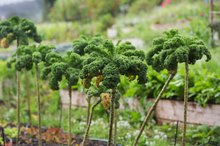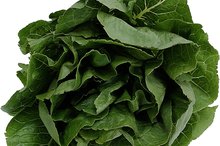A nose bleed, a condition known as epistaxis, generally happen at the septum, or the part of the nose that separates the nasal chambers. On the whole, nose bleeds are not dangerous, although they may mark a more critical problem such as a head injury. Your physician may recommend cauterization of the inside of your nose if you experience frequent nose bleeds, but you may also need vitamin and mineral supplements.
Vitamin K
When it comes to bleeding, getting enough vitamin K in your diet is important. This vitamin ensures that your blood clots normally; when you experience a deficiency, you may bleed excessively, including nose bleeds. You may be especially at risk of a vitamin K deficiency if you have liver disease, burns or celiac disease. Mostly people get the vitamin K they require from liver and green vegetables, but if you need more to meet your needs, you may take a supplement. Adults require 90 to 120 mg of vitamin K each day 1.
- When it comes to bleeding, getting enough vitamin K in your diet is important.
- Mostly people get the vitamin K they require from liver and green vegetables, but if you need more to meet your needs, you may take a supplement.
Potassium
Vitamins That Increase Blood Flow
Learn More
The potassium in your diet regulates the fluids in your body, including the amount of water your body contains. Without enough potassium, you may risk dehydration, and this can cause your body tissues to dry out -- including the tissues on the inside of your nose, which can trigger nose bleeds. Your body requires 2,000 mg of potassium each day to combat dehydration. You can take potassium supplements or eat bananas, avocados and tomatoes.
- The potassium in your diet regulates the fluids in your body, including the amount of water your body contains.
- Without enough potassium, you may risk dehydration, and this can cause your body tissues to dry out -- including the tissues on the inside of your nose, which can trigger nose bleeds.
Vitamin C
Vitamin C plays an important role in decreasing your risk of nose bleeds. Vitamin C prevents a condition known as scurvy, a symptom of which is excessive bleeding such as nose bleeds. Vitamin C is also important for strengthening blood vessels, including those on the inside of the nose that can burst to trigger nose bleeds. Include 75 to 90 mg of vitamin C in your diet each day, whether from vitamin supplements or the foods you eat.
- Vitamin C plays an important role in decreasing your risk of nose bleeds.
- Vitamin C is also important for strengthening blood vessels, including those on the inside of the nose that can burst to trigger nose bleeds.
Iron
Does Vitamin B12 Make You Lose Weight?
Learn More
Get more iron in your diet to prevent nose bleeds. An iron deficiency, sometimes triggered by blood loss, can cause anemia. This condition causes lethargy and easy bruising due to an increased risk of bleeding. This bleeding can also take the form of nose bleeds. While organ meats, red meat, seafood, whole grains and molasses can provide the bulk of the 8 to 18 mg of iron you need each day to prevent anemia and nose bleeds, an iron supplement can ensure you get the amount your body requires.
- Get more iron in your diet to prevent nose bleeds.
- An iron deficiency, sometimes triggered by blood loss, can cause anemia.
Related Articles
References
- University of Maryland Medical Center; Vitamin K; June 2009
- University of Maryland Medical Center; Potassium; March 2009
- MedlinePlus: Fluid and Electrolyte Balance
- University of Maryland Medical Center; Vitamin C (Ascorbic Acid); June 2009
- Sforza C, Grandi G, De Menezes M, Tartaglia G, Ferrario V. Age- and sex-related changes in the normal human external nose. Forensic Sci Int. 2011;204(1-3):205.e1-205.e9. doi:10.1016/j.forsciint.2010.07.027
- Sharma P, Arora A, Valiathan A. Age changes of jaws and soft tissue profile. ScientificWorldJournal. 2014;2014:301501. doi: 10.1155/2014/301501
- Lee JW, McHugh J, Kim JC, Baker SR, Moyer JS. Age-Related Histologic Changes in Human Nasal Cartilage. JAMA Facial Plast Surg. 2013;15(4):256-262. doi:10.1001/jamafacial.2013.825
- Feng Wen Y, Ming Wong H, McGrath CP. A longitudinal study of facial growth of Southern Chinese in Hong Kong: Comprehensive photogrammetric analyses. PLoS One. 2017; 12(10): e0186598. doi: 10.1371/journal.pone.0186598
- Sforza, Chiarella, Grandi, Gaia, De Menezes, Marcio, Tartaglia, Gianluca M and Ferrario, Virgilio F. Age- and Sex-Related Changes in the Normal Human External Nose. Forensic Science International. Vol 204, Issue 1-3, pp. 205.e1-205.e9
- van der Heijden P, Korsten-Meijer AG, van der Laan BF, Wit HP, Goorhuis-Brouwer SM. Nasal growth and maturation age in adolescents: a systematic review. Arch Otolaryngol Head Neck Surg. 2008 Dec;134(12):1288-93. doi: 10.1001/archoto.2008.501
Resources
Writer Bio
Nicki Wolf has been writing health and human interest articles since 1986. Her work has been published at various cooking and nutrition websites. Wolf has an extensive background in medical/nutrition writing and online content development in the nonprofit arena. She graduated with a Bachelor of Arts in English from Temple University.









